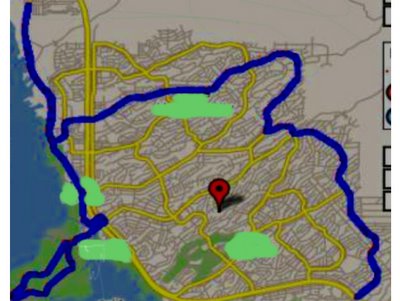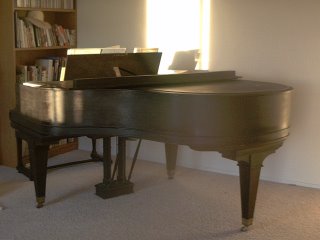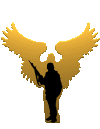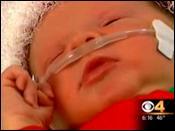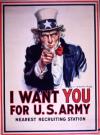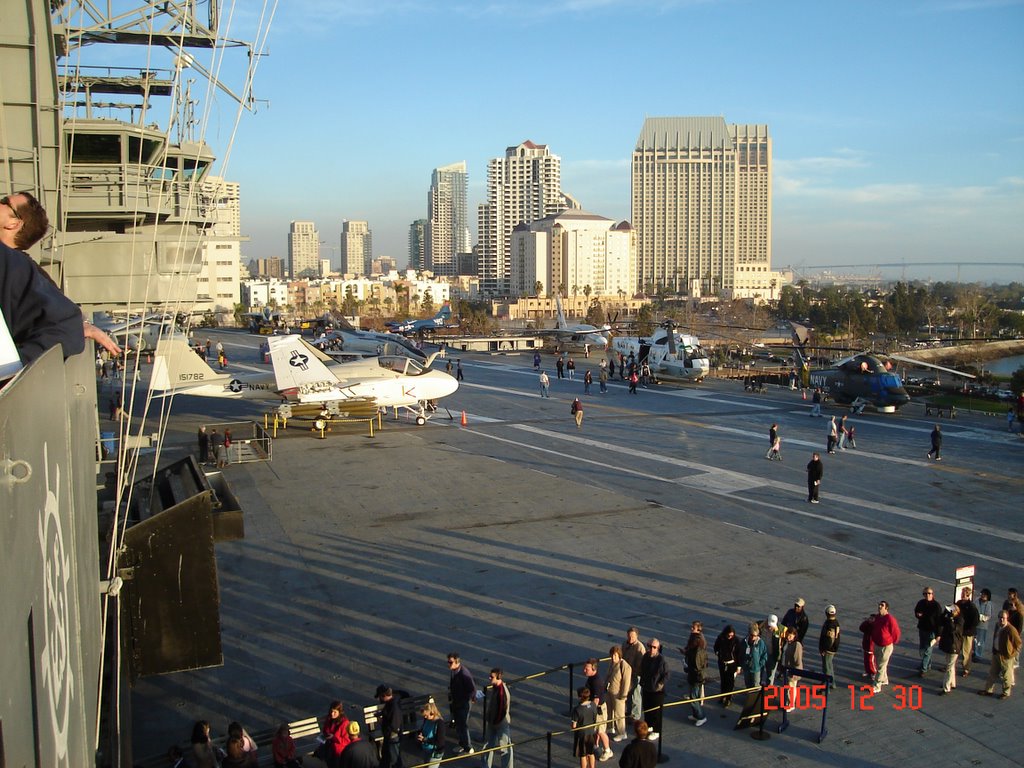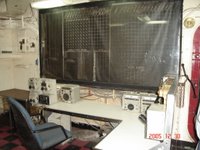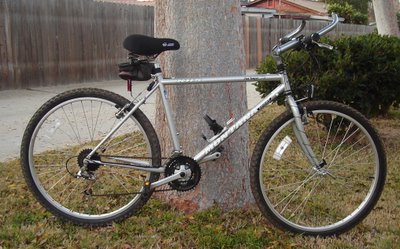Travelogue I
Travelogue II

(from www.thecemetaryproject.com)After the
intensity of the
visit to the VA Hospital, I found I didn't particularly want to talk to or associate with anyone; it took too much mental and emotional energy to interact. I felt a strong desire to visit
Arlington National Cemetery. Alone.
Strange that I would seek what many see as an overwhelming emotional experience (a visit to Arlington) after my first day's intensities, but somehow part of me seemed to know its peaceful and contemplative aspects were just what I needed. The pull was
so strong. As I emailed to a friend after the day with the VA:
Too much to talk about right now. I still have a lot to sort through mentally--from the wounded vets I met, to their families, to the conversations with the men of MOPH that accompanied us... just a lot... I think that's part of why I just want to do some sight-seeing [in DC] tomorrow: spend some quiet time thinking about and honoring the people on whose sacrifice this country has been built.
Having lived on the Delmarva (DE, MD, VA) peninsula for 8 years as a child, I
may have visited Arlington as a youngster, but I certainly didn't understand it, and I have only hints of a memory of it--perhaps we only rode the bus through it? Yet somehow I knew that was where I needed to be.
And I was right. I
did find some perspective and a bit of peace.
I took the Metro to Arlington, which meant a transfer at the Pentagon (which was an experience all its own). There was a bitterly cold wind, and by the time I walked from the Arlington station up to the visitor's center, my legs were numb. I longed to just wander the grounds, but the bitter cold convinced me to pay for the tour bus.
I got off the bus and walked along the road while the rest of the people went to the Kennedy memorial. I wasn't interested in seeing the tomb of any famous person, or seeing the near-worshipful reactions I expected of many at President Kennedy's memorial. I'd come to try to understand all the everyday sacrifices that had been made for our country, made by people who had quietly and anonymously done their jobs.
I walked along the road, reading headstones as I waited for the bus to continue. From the birth and death dates I could deduce whether they'd died in battle and in which war(s) they'd likely fought. But that wasn't enough information for me. Gazing at thousands of headstones spread on those hills, I realized how many people had nobly served, but whose stories we didn't know.
What did they do in the war? How did they die, if on the battlefield? Did they have a long and happy life after the war, or did their experiences leave them so changed they struggled to return? What of the wives buried next to them, the women who kept the homefires burning? So many stories I would never know, yet I could stand there living the life I do because of what they had collectively done.
People whom nobody but those who loved them knew about... In my heart they somehow felt connected to the heroic patients at the VA hospital, people whose names and stories would likely never be known outside their family and caregivers. It somehow seemed
wrong.
In the middle of these reveries, I suddenly noticed the back of a headstone that was quite unique. It was a simple marker like its neighbors, but the inscription stood out. All the other headstones included simply an ID number or a last name on the back. But this one was different: "Orwat, Fighter Pilot." I chuckled to myself, imagining that a young man had gone off to war full of a fighter pilot's bravado and pride, leaving instructions for his headstone if he didn't return.
I walked past the marker so I could turn and see the front. Much to my surprise, it was no swaggering youngster buried there.
Major General Norman S. Orwat of the U.S. Air Force, fighter pilot of WWII, lived a long and productive life, ending his military career as a Deputy Director under the Joint Chiefs of Staff. But, once a pilot,
always a pilot, of course... I returned to the bus, smiling.

The next stop was the
Tomb of the Unknowns. The historian in me has always been fascinated by it, and I'd watched enough documentaries to know what I would be seeing. But I was in for a special treat: the Changing of the Guard ceremony was conducted by the commander featured in the wonderful documentary,
Arlington: Field of Honor. The two soldiers who stood guard during the time I was there seemed to do an impeccable job, but the guy in the photo on the left (from the official website) was in a league of his own. The gravity, discipline, and precision with which he moved was amazing, and force of his presence and bearing was stronger than possibly anyone I've ever encountered.
There was some kind of construction nearby and so the air in that solemn place was often filled with the crashing and groans of heavy equipment. At first I was disappointed, but then I realized that it fit. In the presence of death, the world still went on around us, everyday life was being lived... for the sacrifices we were commemorating had helped to make that living possible.
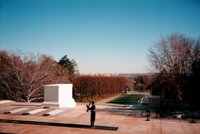
I watched the ceremony from a corner of the balcony, alongside a man of obvious military bearing. We both stayed in our positions for awhile after the ceremony was over and most people had gone. It seemed we shared an unspoken companionship as we glanced occasionally at each other, and I wondered if he was thinking along the lines I was. My mind was filled with consideration of what made this memorial site so special and powerful and worthwhile, why the sentinels were so careful and precise. I think that in part it is because this devotion to impeccable ritual and perfectionistic self-discipline is a gift to those who have fallen... to those whom we cannot honor by reading their names or telling their stories to our children. So we selected this beautiful spot overlooking our nation's capital city and offer a representative piece of ourselves, sentinels of total devotion who will ensure that though they are "known but to God," we
do know of their sacrifice, we are grateful for it, and we will always remember.
I was suddenly filled with gratitude for the sentinels who help remind us that among our honored fallen there are no small sacrifices, that each gave all they had. Though their stories were lost, we do know one thing about each Unknown: "he did his duty." And for that he is worthy of honor. I walked down the stairs toward the ropeline that would allow me the closest face-to-face encounter with the sentinel. When he came to the end of his walk and before he made his about-face, I couldn't help but make a small nod of my head and mouth the words, "Thank you." I don't know if I crossed his field of vision or not, but it just seemed important to do.
Read More......
